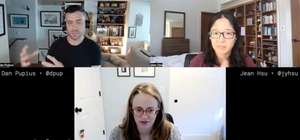In this episode of Lead Time Chats, Jean Hsu, VP of Engineering at Range, chats with Douglas Ferguson, Founder of Voltage Control, about feedback and performance conversations in a remote work environment.
Douglas and Jean discuss:
- When a large meeting shouldn’t be a large meeting at all — and how to address meeting FOMO
- Ways to break down larger meetings into smaller group breakouts to include everyone in discussions
- Avoiding the one-to-many broadcast of information in live meetings, instead opting for async recorded Looms that people can watch on their own.
- How to make change at your organization when you don’t feel like you’re in a position to do so.
Other Resources
- Make change with Voltage Control's Making Change meeting template — and run your meeting right in Range.
- Want more magical meetings? Get the book co-authored by Douglas Ferguson to learn how.
- Use this meeting template to run your own version of a 1-2-4-all meeting, as mentioned by Douglas.
- Check out Voltage Control's Change Guide to help define the "why" behind the change you want to see on your team or company.
Takeaways from Douglas
Ensure the meeting should actually be a large meeting
”I would say the number one thing is, should it be a larger meeting? I think there's a whole category of larger meetings that is the result of meeting FOMO where people want to be there, because if they're not there, then they're gonna miss out. And I think that's indicative of bigger issues within the organization, one of them being a lack of trust, transparency, maybe we're not doing a great job of documenting and disseminating information. We're not telling the story around the meetings we're having and so sometimes we have big meetings that really should be small meetings.”
Keep the focus on the meeting’s purpose
”In that consideration process, we can think about the why, the purpose of the gathering, and we can get really clear on what are we wanting to accomplish from an outcome standpoint? How I even measure those successful? That's a pretty good way to think about like our purpose and some design constraints. If we use that to lean in to how we approach it, then we're going to be in a much better perspective. You'll find that people's ideas tend to be more aligned with things that are going to be successful because we're rooted in that purpose, and we'll have more grace for any of our failures as well, because it sends a little off our tolerance for those things being off will be much higher because we all agree that we're here for a good reason. It's not a big deal this thing's broken over here, or this is not as perfect as it could be because at least we know we're here for a good reason and we're gonna make the best of our time together. So it's like the purpose can't be understated, 'cause it can really work wonders just to get everyone motivated and everyone supporting where we're going.”
Allow ample time for connections and digesting information
”The more people you have, you have to think about all the the inner connections, right? If you got two people, it's basically just one point of connection, right? I'm connected to you right now. If there's three people in the room, well now you've got more expanding connections and it amplifies exponentially, right? The more people you didn't have in the room, if you were to really have everybody talk to everyone, it becomes nearly impossible. So you need to think about how you group people together into breakouts or subgroups so that you can allow people to have their own conversations and that's what will create more opportunity for participation. You can also invite people to just think quietly to themselves. I want you all to take a minute just to really think about what the CEO just said. How many times have we heard that? Right. It's usually like any questions? It's like, well, let's just take a minute to reflect on what he just said or what she just said and really internalize what it means for me. And then maybe let's have some questions 'cause then we've had time to process. So that's another recommendation I have for any meeting, any session, slow it down. Give people time to digest some of the moments that are happening. I think there's a tendency to just stuff as much stuff as we can into our experiences. Give it room to breathe.”
Enjoy Lead Time Chats?
Subscribe to the Lead Time Chats podcast on Apple, Spotify, or wherever you listen to podcasts, so you don’t miss any episodes.
Please leave us a rating or review on iTunes! It'll help these chats get in front of more engineers and leaders like yourself.
About Lead Time Chats
Listen in on unscripted conversations between Jean Hsu, VP of Engineering at Range and other leaders in tech to help you make remote teamwork a little bit less challenging.
Lead Time Chats is brought to you by Range. Range helps remote teams work better together — with asynchronous check-ins, integrated team-building, fewer and more effective meetings, and easy goal-tracking. When you run your team with Range, you’ll always know what’s going on — without having to be in back-to-back meetings.
Checking-in with Range creates more focus time for heads-down work, all while feeling a deeper sense of connection and belonging with your team.
To learn more about Range, you can check it out here.
Season 4 Episodes
» Episode 1: Najeeb Khan on Fostering Belonging on Remote Teams
» Episode 2: Hong Quan on Hiring for Remote Teams
» Episode 3: Jori Lallo on Working Effectively Across Timezones
» Episode 4: Suzan Bond on Navigating Conflict on Remote Teams
» Episode 5: Andy Detskas on Building an Inclusive Team
» Episode 6: Steph Mann on reinforcing values on remote teams
» Episode 7: Fred Plais on Globally Distributed Teams
» Episode 8: Brooks Scott on Fostering Diversity and Inclusion on Remote Teams
» Episode 9: Joaquín Roca on Feedback and Performance Conversations on Remote Teams
Season 3 Episodes
» Episode 1: Jen Kim on how startups can hire better
» Episode 2: Kate Heddleston on managing burnout on your team
» Episode 3: Jessie Duan on the Chief of Staff to CTO role
» Episode 4: Dan Na on pushing through friction
» Episode 5: Pat Kua on flavors of tech leadership
» Episode 6: Anna Sulkina on Endurance Sports and Software Engineering
Season 2 Episodes
» Episode 1: Camille Fournier on making boring plans
» Episode 2: Tess Rinearson on early career engineering managers
» Episode 3: Kim Scott on building for systemic justice
» Episode 4: Sumeet Arora on moving on from a big company
» Episode 5: Rachael Stedman on IC manager work
» Episode 6: Chris Bee on Behaviors of Effective Eng Leaders
» Episode 7: Lynne Tye on the Engineering Hiring Landscape
» Episode 8: Beau Lebens on Distributed Team Meetups
» Episode 9: Indrajit Khare on Getting Acquired by Google
» Episode 10: Jack Danger on Technical Debt
» Episode 11: Sarah Milstein on Successful Remote and Hybrid Teams
Season 1 Episodes
» Episode 1: Will Larson on the path of the senior engineer
» Episode 2: Duretti Hirpa on mentoring junior and mid-level engineers
» Episode 3: Cate Huston on working with an external coach
» Episode 4: Juan Pablo Buriticá on common eng manager mistakes
» Episode 5: Gergely Orosz on the decision to go into management
» Episode 6: Lara Hogan on leading effectively in a pandemic
» Episode 7: Kaya Thomas on common early career engineer challenges
» Episode 8: Uma Chingunde on starting a VPE role in a pandemic
» Episode 9: Katie Wilde on supporting your team's mental health
» Episode 10: Akhil Gupta on navigating uncertainty in new roles
» Episode 11: Harper Reed on giving everyone a voice in team meetings
» Episode 12: Marc Hedlund on sponsorship








